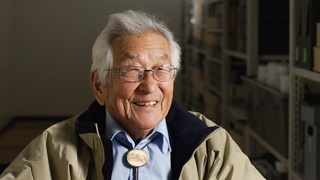Entrevistas
Adjustment to American life
We arrived in San Francisco okay. As we got off the ship, our parents found us. For them it was a very emotional thing, for us it was kind of awkward. There's two people there trying to hug us and so forth, but we’re saying, “Gee, who are these people?” It’s kind of a strange feeling. Then ultimately, we arrived in Los Angeles. We stayed in anarea called Bunker Hill.
The adjustment I would say was difficult. The language, being the biggest barrier. American English language is not something that's easy to comprehend by Japanese. In Japanese everything is monosyllable and the English language have all these pronunciation and exceptions, and so forth that’ll drive you crazy. Grade-wise, I would get two A’s, one was mathematics naturally and physical education. And then everything else would be F’s, failure, or D. By the time I got to the eighth grade, I was beginning to get the hang of the English language, and I was more or less functional in a classroom.
I think my parents knew our story through our relatives. And I’m sure my parents have very strong, difficult stories of their lives, of their internment, losing everything they had, being thrown into a camp with thousands of other people and coming out with basically no money, and start a new life. All these things are difficult things. And Japanese as a culture, they bear it. They don’t like to speak about unhappy events too much. And I think my parents are no different, they're basically Japanese—although they’re Niseis—their culture background is Japanese.
I don’t think they wanted to burden us with any unhappiness. Most of all their focus was to make our transition smooth. I had to really credit my parents for their understanding and their tremendous effort to make our transition into the American life as smoothly as possible. It's commendable I think.
Fecha: September 3, 2019
Zona: California, US
Entrevista: Masako Miki
País: Watase Media Arts Center, Japanese American National Museum
Explore More Videos

Vida escolar en la posguerra (Inglés)
(n. 1930) Medio japonesa y creció en Japón y los Estados Unidos.


On international marriages (Japanese)
(n. 1925) Novia de la guerra

Conflicted about immigrating to America (Japanese)
(n. 1925) Novia de la guerra

Feeling prejudice while looking for jobs
(1919 - 2015) Nisei que sirvió en la Segunda Guerra Mundial con el Regimiento de Infantería 442°

Invited to teach at Harvard by his boss
(1919 - 2015) Nisei que sirvió en la Segunda Guerra Mundial con el Regimiento de Infantería 442°

After being discharged and returning to the nursery business
(n. 1921) Veterano nisei que sirvió en la ocupación de Japón

Okinawan Americans
Okinawense estadounidense cuyos padres son de Perú.


Able to settle easily in Los Gatos with foresight and luck
(n. 1935) Empresario sansei.


Parents identification as Peruvian Okinawan
Okinawense estadounidense cuyos padres son de Perú.

American values she aligns with
Okinawense estadounidense cuyos padres son de Perú.

Working together in Okinawa using three languages
Okinawense estadounidense cuyos padres son de Perú.

Mother founded Japanese language school in neighbors’ backyard
Juez Sansei en la Corte Superior del Condado de Los Ángeles en California
